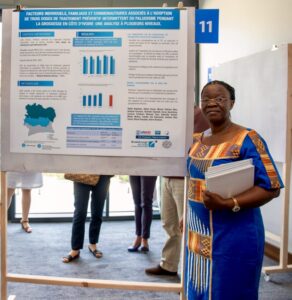
Dr. Bleu at the 2019 RBM Social and Behavior Change Working Group Annual Meeting. Photo Credit: Breakthrough ACTION
As the oldest of her siblings, Dr. Monne Thérèse Bleu Bomin often looked after her little sister. One day, when Dr. Bleu was 12 years old, she saw her four-year-old sister’s eyes roll into her head as she started convulsing.
At the time, Dr. Bleu and her family called this “maninh,” the local term for the illness, and brought her sister to a traditional healer. At the time, it was rare for children to survive maninh. Fortunately, however, Dr. Bleu’s sister survived.
Years later, Dr. Bleu went to medical school and discovered that severe malaria caused her sister’s convulsions. It was then that Dr. Bleu made it her life’s mission to defeat the disease.
Today, Dr. Bleu works with the Ministry of Health and Public Hygiene in Côte d’Ivoire. As the National Malaria Communication and Partnership Officer, she uses data to craft social and behavior change strategies to help families and communities prevent and manage malaria. Dr. Bleu had long recognized the need for behavior-focused, theory-based data to make informed decisions. However, the information she had at hand did not provide all the details she and other stakeholders needed to promote malaria prevention and treatment behaviors, including a detailed understanding of individuals’ beliefs, motivations, and community attitudes.
In 2018, with funding from the U.S. President’s Malaria Initiative, the Côte d’Ivoire National Malaria Control Program, other Ivorian governmental and non-governmental organizations, and Breakthrough ACTION implemented the country’s first Malaria Behavior Survey to fill the data gap. This household questionnaire on malaria-related behaviors and influential psychological and social factors produces actionable data to inform malaria social and behavior change interventions.
In Côte d’Ivoire, the Malaria Behavior Survey asked nearly 6,000 households about behaviors such as seeking care for children with fever, sleeping under a mosquito net, and taking malaria prevention medication during pregnancy.
The survey revealed that people were 90% more likely to seek immediate and appropriate care for their feverish child if they believed others in the community were also doing this. People were also more likely to seek prompt care for their feverish child if they had a positive attitude toward care-seeking, talked about malaria with their spouse, thought community health workers are good at treating malaria in children, or believed that antimalarial drugs would be available at the health center.
“The Malaria Behavior Survey lets us be targeted in our strategies, focusing on the most significant determinants driving malaria behavior,” said Dr. Bleu.
Using these data, the National Malaria Control Program defined new behavioral objectives in their 2021-25 National Strategic Communication Plan for Social and Behavioral Change Against Malaria. For example, the strategy now prioritizes increasing the understanding that prompt care-seeking for fever is something most people do in the community and promoting discussion of malaria between spouses. Changes in these understandings and behaviors will be measured over time to assess how this revised strategy fared.
For Dr. Bleu, having these data means Côte d’Ivoire is closer to eliminating malaria. Along with others working on malaria programs in the country, she and her team now have a better understanding of what motivates people to protect themselves from the disease and seek care when sick.
“[The National Malaria Control Program members] are appreciative of the depth of these data as well as the quality of the study,” said Dr. Bleu. The Malaria Behavior Survey has led to the National Malaria Control Program’s strengthened trust in the science behind social and behavior change approaches and a new commitment to using data to create strategies.
